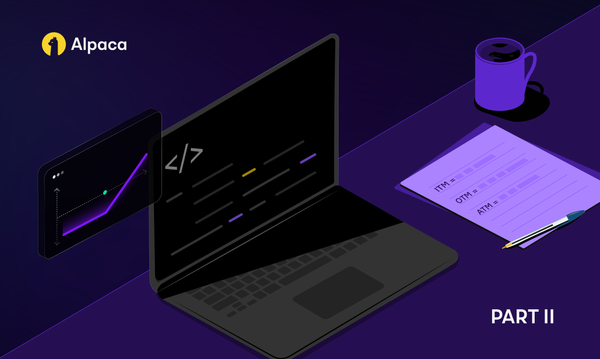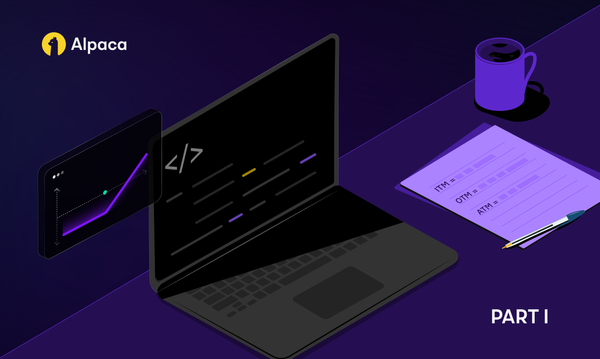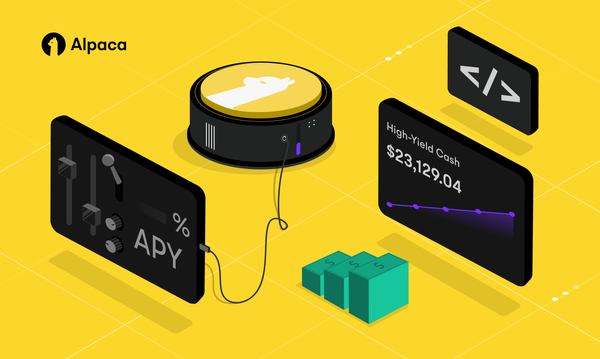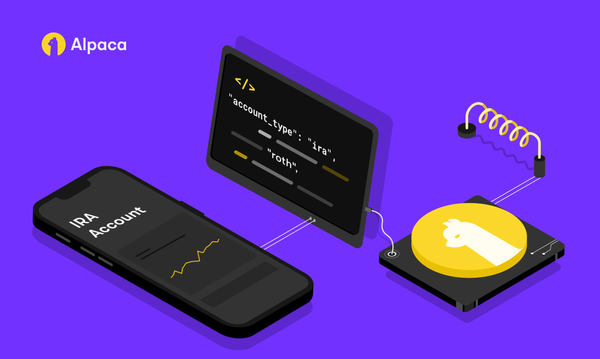Algorithmic Trading through a Business Account at Alpaca
Alpaca now supports business accounts who want to do algorithmic trading. This post should help you to find why useful to trade through a business entity such as a startup hedge fund, prop trading firm etc.


We wanted to expand on our recent announcement that Alpaca now supports business accounts by writing this post discussing the various reasons you might find it useful to trade through a business entity. (Brokerage services are offered through Alpaca Securities LLC)
But before we dive into that, we wanted to address one of the top questions we get about business accounts: are there any additional fees to open and use a business account at Alpaca? The answer is no! Individual and business accounts both have commission-free trading, a 3.75% margin rate*, and a 0.2% easy to borrow short rate.
*Margin rate as of 7/25/19, subject to change depending upon the Fed Funds Rate
Why open a business account?
An API-first trading platform tends to attract sophisticated users. With the popularity of easy to learn programming languages such as Python, there are a number of individuals capable of automating their trading or building trading and investing applications. These pursuits may start out as hobbies or pet projects, but they can be conducive to business opportunities. Perhaps you are building the next great robo-advisor, or you’ve developed a trading strategy using machine learning that significantly outperforms the S&P 500 that you want to use to manage other people’s money. There are many use cases for trading under a business, and in this post we discuss the entities that we count among our customers today.
Hedge Funds
A hedge fund, typically formed as a domestic limited partnership or offshore LLC (or both), is a common structure used to manage other people’s money efficiently and at scale. Investor assets are pooled into one entity, which may help reduce administrative, operational, and trading expenses compared to the cost incurred by smaller, separate accounts all trading the same strategy. On the other hand, investors in hedge funds are also exposed to risks of the structure, including lack of control and possession of their assets, which they entrust the fund manager to carry out. Discussing all of the pros and cons of hedge funds is beyond the scope of this post, so if you’re thinking about setting up a hedge fund to conduct your trading business, be sure to do your homework.
One of the unique things about Alpaca is that to our knowledge, we seem to be the first and only broker-dealer to provide commission-free trading to hedge funds, which have traditionally executed trades through banks’ brokerages, agency execution desks, and other direct market access and dark pool providers. Transaction costs are comprised of both explicit costs like trading commissions and implicit costs like market impact and the bid-ask spread. They can directly affect fund performance, which in turn, can affect fund marketability and a manager’s performance fees. Depending upon a fund’s portfolio turnover, one study from last year reported brokerage commissions as an approximately 3 to 6 basis point annual expense¹. Greenwich Associates reported similar commission expenses ranging from 3.2 to 6.7 basis points for developed markets². In an era where transaction costs play a significant role in fund returns, commission-free trading may help a fund manager stand out from his peers.
In addition to offering hedge funds with commission-free trading, we make it easier for them (and all users) to focus on generating alpha with our modern, well-documented API, rather than have them get bogged down with a poorly documented technical implementation. We are proud to support both emerging and established hedge funds, and we work closely with them to help address their trading and operational needs.
Proprietary Trading Companies
A proprietary trading company, or prop firm, is a company that trades its own capital rather than manages external investor money. Prop firms might be comprised of one or a handful of owner/operators and are commonly structured as LLCs. If you are considering pursuing trading your own capital as a full-time profession, it’s worth considering establishing a business for it. Like any other business venture, it may make recordkeeping cleaner and there may be tax advantages. For example, an S-corp election may allow owners of a trading company to deduct health insurance premiums and retirement plan contributions. Trading through an entity may also be supportive of trader tax status and the election and use of Section 475 MTM accounting. It also might be appropriate to form a company if you are collaborating with friends or acquaintances and need to formalize the partnership.
Technology Companies
Business accounts aren’t limited to companies doing their own trading. Technology and software companies seem to like the simplicity of Alpaca’s API, which makes it easier to build trading and investing applications for mobile, web, and desktop. Coupled with Alpaca’s registered broker-dealer, which supports core compliance, risk, operational, and trading functions, developers can think of this as “brokerage as a service” (BaaS), allowing them to focus on creating a business and offering trading services to their own users. Whether you are looking to build the next Robinhood, Wealthfront, or advanced trading GUI, we are here to support your efforts.
[1] https://www.cembenchmarking.com/ri/insight/17
[2] https://www.greenwich.com/press-release/global-equity-trade-execution-rates-decline-wake-mifid-ii
Technology and services are offered by AlpacaDB, Inc. Brokerage services are provided by Alpaca Securities LLC, member FINRA/SIPC. Alpaca Securities LLC is a wholly-owned subsidiary of AlpacaDB, Inc.
This is not an offer, solicitation of an offer, or advice to buy or sell securities, or open a brokerage account in any jurisdiction where Alpaca is not registered (Alpaca is registered only in the United States).
All investments involve risk and the past performance of a security, or financial product does not guarantee future results or returns. Keep in mind that while diversification may help spread risk it does not assure a profit, or protect against loss, in a down market. There is always the potential of losing money when you invest in securities, or other financial products. Investors should consider their investment objectives and risks carefully before investing.
Commission-Free trading means that there are no commission charges for Alpaca brokerage accounts that trade U.S. listed securities through an API. Relevant SEC and FINRA fees may apply.
© 2019 Alpaca Securities LLC. All rights reserved.
© 2019 AlpacaDB. All rights reserved.




